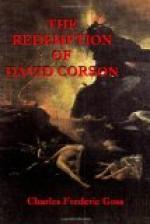“Sir,” said he, with the voice and mien of an apostle, “I perceive that thou art in the gall of bitterness and the bonds of iniquity. Thy money perish with thee. The God of this world hath blinded thine eyes.”
The quack, who now began to take a humorous view of the innocence of the youth, burst into a boisterous guffaw.
“Well, well,” he said in mingled scorn and pity, “reckon you are more to be pitied than b-b-blamed. Fault of early education! Talk like a p-p-parrot! What can a young fellow like you know about life, shut up here in this seven-by-nine valley, like a man in a b-b-barrel looking out of the b-b-bung-hole?”
Offended and disgusted, the Quaker was about to turn upon his heel; but he saw in the face of the man’s beautiful companion a look which said plainly as spoken words, “I, too, desire that you should go with us.”
This look changed his purpose, and he paused.
“Listen to me now,” continued the doctor, observing his irresolution. “You think you know what life is; but you d-d-don’t! Do you know what g-g-great cities are? Do you know what it is to m-m-mix with crowds of men, to feel and perhaps to sway their p-p-passions? Do you know what it is to p-p-possess and to spend that money which you d-d-despise? Do you know what it is to wear fine clothes, to d-d-drink rare wines, to see great sights, to go where you want to and to do what you p-p-please?”
“I do not, nor do I wish to. And thee must abandon these follies and sins, if thee would enter the Kingdom of God,” David replied, fixing his eyes sternly upon the face of the blasphemer.
“God! Ha, ha, ha! Who is He, anyhow? Same old story! Fools that can’t enjoy life, d-d-don’t want any one else to! Ever hear ’bout the fox that got his tail b-b-bit off? Wanted all the rest to have theirs! What the d-d-deuce are we here in this world for? T-t-tell me that, p-p-parson!”
“To do the will of our Father which is in heaven.”
“To do the will of our Father in heaven! I know but one will, and it is the w-w-will of Doctor P-p-paracelsus Aesculapius. I’m my own lord and law, I am.”
“Know thou that for all thy idle words, God will bring thee to judgment?” David answered solemnly.
“Rot!” muttered the doctor, disgusted beyond endurance, and concluding the interview with the cynical farewell,
“Good-bye, d-d-dead man! I have always hated c-c-corpses! I am going where men have red b-b-blood in their veins.”
With these words he turned on his heel and started toward the carriage, leaving David and Pepeeta alone. Neither of them moved. The gypsy nervously plucked the petals from a daisy and the Quaker gazed at her face. During these few moments nature had not been idle. In air and earth and tree top, following blind instincts, her myriad children were seeking their mates. And here, in the odorous sunshine of the May morning, these two young, impressionable and ardent beings, yielding themselves unconsciously to the same mysterious attraction which was uniting other happy couples, were drawn together in a union which time could not dissolve and eternity, perhaps, cannot annul.




